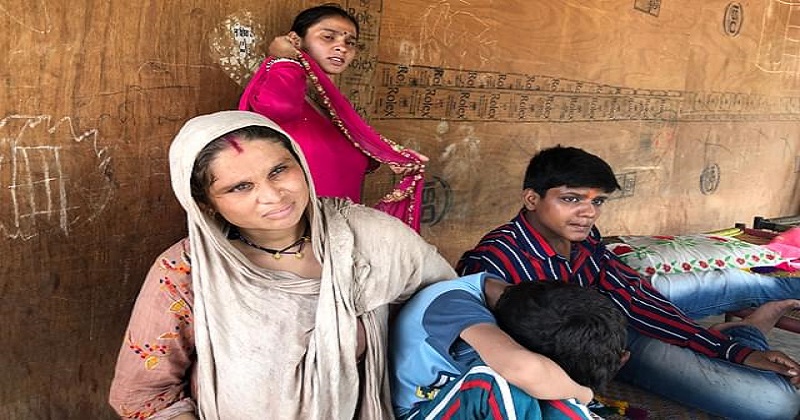
Being a refugee is a lot more than merely a ‘crisis’. There is a United Nations High Commissioner for Refugees, and refugee links and protocols. Many times, the world meets up and attends to the laments for refugees. But, possibly, only a refugee comprehends the actual pain of being a fugitive. No code or protocol helps.
A lot of Pakistani Hindus who have moved to India looking for shelter and citizenship are caught in a tangle of guidelines and rules which have left them stateless for years. Mohammed Iqbal endures their difficulty and the politics around citizenship.‘Hindus are like fish out of water in Pakistan. They all want to come to India, hoping to put an end to their misery – but it is a different story here altogether,’ says Krishan Lal, who is one among the group of 145 Hindus who escaped Pakistan on a pilgrimage visa. He now resides in a refugee camp in North Delhi, pleading that the Indian government will grant him permanent shelter.
The Hindu minority, under attack in Pakistan, particularly from abductions, rapes, and compelled conversion of their women, is increasingly frantic to get out. The general flow of refugees has increased quickly in the last year. Until mid-2011, 8-10 families traversed the boundary, that number has now risen to 400. Even this number, is artificially low, held down by severe Indian visa ordinances, notably after the 2009 Mumbai attack. Only one in five visa applications are permitted.

Those who are fortunate enough to cross the border are pushed into refugee camps, where they pine without rights or consideration in a ‘no man’s land.’ The Indian government handles them as an inconvenience that is best neglected. For example, Pujari Lal fled in 1999 after his teenage sister was kidnapped and abused. He now resides in Khanna, Punjab, in a settlement with 1,200 other Hindu and Sikh refugees.‘It has been 13 years but I still don’t have Indian citizenship. My papers have come back a dozen times. They want proof of my father’s date of birth and birthplace. My father is dead: my mother is with me but we do not have all the papers,’ he says.
As Rajya Sabha MP Avinash Rai Khanna denotes, over 3,500 families who left for Jammu in 1947 have still not received citizenship. Since they’re not Indian citizens, expatriates are still subservient to the same constraints as other Pakistanis – no ration card, driver’s license, right to purchase property, gas connection, or travel within the nation. ‘When our children fall ill, the government hospitals refuse to give us medicines, saying we are Pakistanis,’ says Jamuna Devi. Most are compelled to live in an uncertain existence reliant on the vagaries of the Indian and Pakistani officials. To live in the country, they must take their Indian visa extended on a yearly basis, and renew their passport.
And, the expectation for citizenship remains dark. Of the 148 applications received only from Punjab (in Pakistan) between 2009-2011, just 16 were accepted, 119 are stuck in isolation due to incomplete records, and 13 have been denied. Append to this an ‘active policy of discouragement’ that does it remarkably hard and costly for Pakistani Hindus to obtain a visa, and the information from the Indian state becomes crystal-clear: We don’t want you. Well, neither does Pakistan, where minorities have become an easy scapegoat in a spirit of extremism. These tales are one part of a harsh reality not just for Hindus, but also for Christians and minority Muslims such as Hazara and Ahmadi communities. Last September, 26 members of the Hazara community were compelled to descend from a bus by gunmen and shot dead.
The question for Indians is what role will we perform in this unfolding catastrophe. The answer is constantly mixed by the dynamics of our internal immigration politics. While the BJP has developed as a champion of Pakistani Hindu refugees, as Assam Chief Minister Tarun Gogoi’s position that all Bangladeshi migrants ‘who were compelled to leave their country because of some valid reasons, ‘deserve’ humanitarian consideration, irrespective of their religion.’ Muslim migrants are not honored in Assam, according to the BJP analysis, because they do not meet religious abuse.
So why are Indians seeking asylum? Where then does Hindu nationalism figure in refugee claims from India? The reasons vary and intersect. Refugee case law from the past two years provides an insight into the minority of Indian refugee claims which are being recognized. The cases are amongst the minority of refugee decisions that are published worldwide – cases from other nations of asylum with a considerable number of Indian claimants often go unpublished. While it is challenging to determine the extent to which Indians have escaped the country due to perils connected with the emergence of Hindu nationalism, it is obvious that official decision-makers abroad have begun receiving claims of this profile.
Read more; Shelling in the rebel-held city of Syria, kills 16
Prominently, all the refugee applications indicated were filed before the adoption of the CAA, the announcement of the final NRC list for Assam, and the abolition of Article 370 in Kashmir. With reports of police brutality and mass detentions targeting activists and Muslims, the installation of detention centers for those who fail to make the NRC, and suppressing the freedom of speech in Kashmir, the number of Indians being identified as refugees based on risks linked with increasing Hindu nationalism will only rise. If humanitarian benefits and protection of the crucified were priorities as advocates of the CAA suggest, this would not be the plight.

Post Your Comments